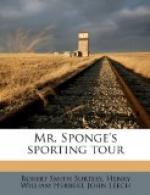Lord Scamperdale was the eighth earl; and, according to the usual alternating course of great English families—one generation living and the next starving—it was his lordship’s turn to live; but the seventh earl having been rather unreasonable in the length of his lease, the present earl, who during the lifetime of his father was Lord Hardup, had contracted such parsimonious habits, that when he came into possession he could not shake them off; and but for the fortunate friendship of Abraham Brown, the village blacksmith, who had given his young idea a sporting turn, entering him with ferrets and rabbits, and so training him on with terriers and rat-catching, badger-baiting and otter-hunting, up to the noble sport of fox-hunting itself, in all probability his lordship would have been a regular miser. As it was, he did not spend a halfpenny upon anything but hunting; and his hunting, though well, was still economically done, costing him some couple of thousand a year, to which, for the sake of euphony, Jack used to add an extra five hundred; ’two thousand five under’d a year, five-and-twenty under’d a year,’ sounding better, as Jack thought, and more imposing, than a couple of thousand, or two thousand, a year. There were few days on which Jack didn’t inform the field what the hounds cost his lordship, or rather what they didn’t cost him.
Woodmansterne, his lordship’s principal residence, was a fine place. It stood in an undulating park of 800 acres, with its church, and its lakes, and its heronry, and its decoy, and its racecourse, and its varied grasses of the choicest kinds, for feeding the numerous herds of deer, so well known at Temple Bar and Charing Cross as the Woodmansterne venison. The house was a modern edifice, built by the sixth earl, who, having been a ‘liver,’ had run himself aground by his enormous outlay on this Italian structure, which was just finished when he died. The fourth earl, who, we should have stated, was a ‘liver’ too, was a man of vertu—a great traveller and collector of coins, pictures, statues, marbles, and curiosities generally—things that are very dear to buy, but oftentimes extremely cheap when sold; and, having collected a vast quantity from all parts of the world (no easy feat in those days), he made them heirlooms, and departed this life, leaving the next earl the pleasure of contemplating them. The fifth earl having duly starved through life, then made way for the sixth; who, finding such a quantity of valuables stowed away, as he thought, in rather a confined way, sent to London for a first-rate architect. Sir Thomas Squareall (who always posted with four horses), who forthwith pulled down the old brick-and-stone Elizabethan mansion, and built the present splendid Italian structure, of the finest polished stone, at an expense of—furniture and all—say 120,000_l._; Sir Thomas’s estimates being 30,000_l._ The seventh earl of course they starved; and the present lord, at the age of forty-three, found himself in possession




